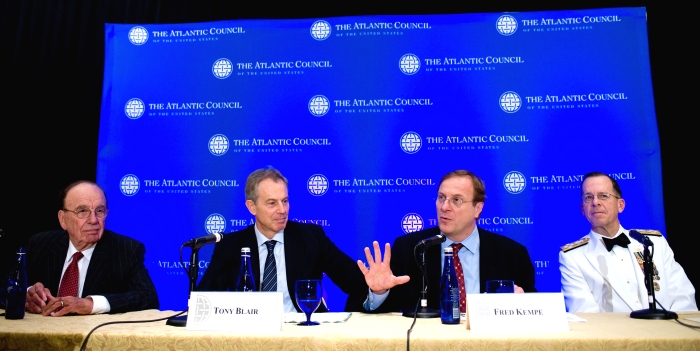
- At think tank Atlantic Council – Media mogul Rupert Murdoch, former British Prime Minister Tony Blair, Atlantic Council president Frederick Kempe and Adm. Mike Mullen, chairman of the Joint Chiefs of Staff.
Introduction
Think Tanks are powerful organizations that set the policy agenda in the United States and in many other countries. The big think tanks such as Council on Foreign Relations, Brookings Institution, American Enterprise Institute etc decide both the domestic and foreign policy of the United States. Other purposes think tanks serve includes providing the personnel for the administration after an election, people who are members of these big think tanks, go on to hold important positions in the government.
Here is an overview of think tanks.
Table of Contents:
1. What are think tanks and their Importance
2. Classifying think tanks
3. History of think tanks
4. Funding of think tanks
5. Think tank Personnel
6. Think tanks market their Ideas
7. Some of the key think tanks
What are think tanks and their Importance
Think tanks are organizations that conduct research and devise public policies. Think tanks apart from research are also involved in advocacy of their recommended policies. Think Tanks are also called policy institutes and policy making organizations. They research a wide range of topics such as economics, education, health policy, foreign policy, resources and energy policy, defense, population issues, urbanization, scientific policies etc. In fact hundreds of these think tanks research all areas concerning both politics and society. Think tanks are mostly private and nonprofit organizations. According to the 2016 Global Go To Think Tank Index (GGTTI) report, there are about 6846 think tanks around the globe, most of them are located in the US (1835). Think tanks are not homogeneous and vary in terms of size, structure, budget, scope and impact. Name of some of the prominent think tanks are RAND Corporation, Brookings Institution, Council on Foreign Relations, Club of Rome, Hudson Institute, Atlantic Council.
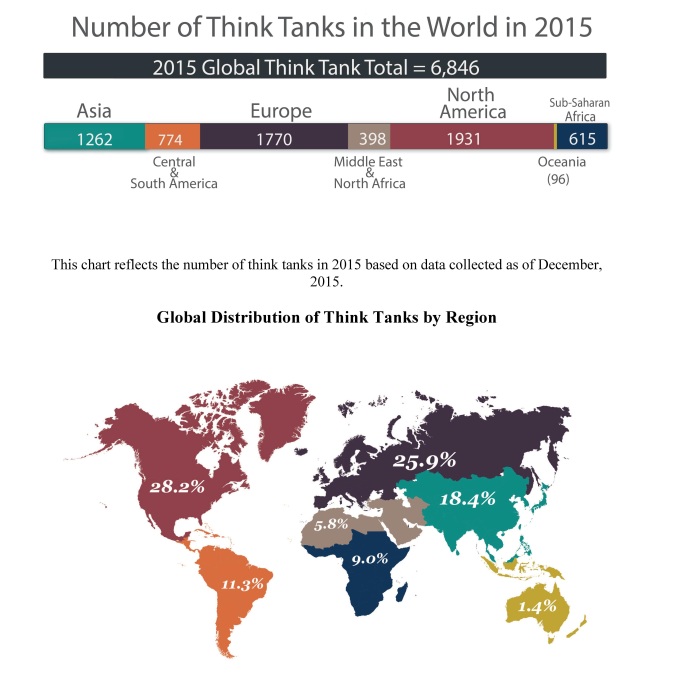
GGTTI Report showing total think tanks and their distribution.
The word think tank was popularized in the late 1950s to mention policy research organizations. The word has its origin in World War II, where the name was used to refer rooms where strategists discussed war planning.
Here is another description from university of Oxford –
Think tanks are public policy research institutes that seek to play a key role in making and influencing global, regional and national policy. While each think tank serves a specific purpose, they all share a common vision to improve their respective spectrums, as well as being sources of new ideas and research.Think tanks engage in research and advocacy in areas such as social policy, political strategy, the economy, the environment, science and technology, industrial or business policies, military analysis, and many more. Think tank researchers influence public opinion and public policy, which is a different focus from traditional academic research at a university. (source-https://www.careers.ox.ac.uk/think-tanks/)
Think tanks play a central role in the policy making process. Think tanks have often been called factory of ideas and policy mills. Think tanks are essential for the elite’s research and planning.
Think tanks provide the research, analysis, strategies and solutions concerning a wide variety of topics and issues. These elitist think tanks like CFR, AEI, Brookings keep on working on the micro and macro levels of their various agendas around the globe. The think tanks elite set up and continue to fund have millions of dollars in annual budget. The big think tanks have the monetary power and the outreach and easily undermine the smaller think tanks. It doesn’t matter which party comes to power, the ideas, strategies and policies come from these same think tanks. As researcher Laurence H. Shoup writes regarding CFR, the most influential think tank in the world, in his book Wall Street’s Think Tank: The Council on Foreign Relations and the Empire of Neoliberal Geopolitics, 1976-2014 – ” The think tank of monopoly-finance capital, the Council on Foreign Relations is the world’s most powerful private organization. The CFR is the ultimate networking, socializing, strategic-planning, and consensus-forming institution of the U.S. capitalist class. It is the central “high command” organization of the plutocracy that runs the country and much of the world. ”
CFR is just one think tank at the elite’s disposal.
These think tanks plan out everything in advance. As mentioned earlier they have think tanks working on everything like environment, urbanization, immigration and even population control like the Optimum Population Trust now called Population Matters. Think tanks are the brain trusts of the shadow government and what we see happening now was all planned by these think tanks. (such things like urbanization, environmental treaties, privatization, trade deals, open borders, digital society, economic reforms, welfare schemes etc).
Many significant things have emerged from these think tanks. Here are just a few examples.
Council on Foreign Relations: United Nations, World Bank, International Monetary Fund- Following the war’s outbreak, the Council on Foreign Relations launched a massive War and Peace Studies project to explore the desirable foundations of postwar peace. The participants in this effort ultimately produced 682 memoranda for the State Department on topics ranging from the occupation of Germany to the creation of the United Nations. (Source- Richard N. Haass)
Designs for International Monetary Fund and the World Bank emerged from the same study project. Read more here on CFR and the creation of IMF and World Bank.
Brookings Institution: The Marshall Plan- When Congress began to craft the European aid program proposed by Marshall, Senator Arthur H. Vandenberg, chairman of the Senate Foreign Relations Committee, contacted Brookings President Harold G. Moulton and asked for the Institution’s help.Brookings “immediately responded in the highest spirit of cooperation and diverted its entire staff to this inquiry,” In less than four weeks, on January 22, 1948, Brookings produced a 20-page report, containing eight specific recommendations for the structure, focus, and operating procedures of the Marshall Plan, which was officially named the European Recovery Program. (Source- Brookings Institution)
The Heritage Foundation and Reagan: When President Reagan took office in 1981, he quickly gave every member of his cabinet an 1,100-page book from the Heritage Foundation, Mandate for Leadership, that provided an outline for conservative principles he wished to enact. Of its 2,000 recommendations, roughly 60% were accepted. (Source- Brookings article)
In 1992 a report by think tanks IIE and the Carnegie Endowment proposing an “economic security council.” The incoming Clinton administration implemented this proposal in creating a National Economic Council (a body that continues today). (Source- Richard N. Haass)
The RAND Corporation played a prominent role in the Cold War. The Club of Rome was behind the environmental movement.
New think tanks are formed for the need of the hour, like the Project for the New American Century (PNAC) which was a neoconservative think tank formed in 1997 and was responsible for the wars in Iraq and Afghanistan. It was dissolved it in 2006 after it had served its purpose.

Brezinski at a CSIS event
This is how the process works, both domestic and foreign policies are devised by these big think tanks, next the government ministers and officials who are also members of these think tanks, just implement these policies and finally the corporate media sells these policies to the unsuspecting public. Public opinion is necessary to back up these policies, especially those which have to do with wars and radical changes. Corporate media also has ties to these same think tanks. Media owners, editors and journalists are CFR members and also hold membership in other think tanks as well.
Another key point to mention is that these big think tanks like CFR, AEI, Brookings, CSIS, Trilateral Commision etc are interconnected. The big think tanks are closely knit together, through common founders, interlocking directorates, cross membership of people, similar sources of funding.
In this way we have a parallel government and the whole idea of democracy is under question. Think tanks are not accountable to the general public, they only answer to their Donors (which generally includes corporations, foundations and wealthy individuals). So another way to look at this process is – your country’s public policies are brought to you by Fortune 500 corporations, elite grant making foundations like Ford Foundation, Rockefeller Foundation, Carnegie Foundation and billionaires like Rothchild, Buffet, Soros etc.
Classifying think tanks
Like their definition and many other things related to them, there is no generally consensus among scholars regarding how to classify think tanks. Here is how I categorize think tanks. Based on location, affiliation, political orientation and area of research. The most precise way to classify them would be by their field of expertise or areas of research. Location, affiliation and political orientation are helpful but don’t tell much about them.
By Location- American think tank, Canadian think tank, British think tank etc. They can have branches in other countries as well. Some American think tanks are Council on Foreign Relations, RAND, Hudson Institute. Examples of some British think tank can be Chatham House, Adam Smith Institute, Demos.
By Affiliation- Are they affiliated to the government, university, political party or some other organization. Some examples
University: The Hoover Institution (Stanford University), The Belfer Center (Harvard University), Center for International Development (Harvard University).
Government: Congressional Research Service (US government), Development Concepts and Doctrine Centre (UK government).
Other Organizations: UN, World Bank, Corporations etc for example United Nations University (UNU), World Bank Institute (WBI).
Independent or no affiliations: CFR, Brookings, CSIS, Heritage Foundation.
By Political Orientation- Think tanks can have political orientation like they can be Libertarian, Liberal, Conservative, Marxist etc. Some examples
Conservative: The Heritage Foundation, Hudson Institute, Hoover Institution, Manhattan Institute
Liberal: The Roosevelt Institution, Institute for Policy Studies, Center for American Progress, Public Citizen.
Libertarian: Cato Institute, Adam Smith Institute, Cascade Policy Institute, Fraser Institute.
Independent: Brookings Institution, Council on Foreign Relations, RAND Corporation.
By Area of Research- What is their main focus. What research they specialize in. Areas like Foreign Policy and International Affairs, Economics, Environmental, Defense and Security, Immigration etc. Although they can and do have multiple areas of research. RAND for example researches many areas including education, economics, social policy etc but nevertheless its main focus is Defense & Security. Some examples
Foreign Policy and International Affairs: CFR,, Atlantic Council, Wilson Centre
Economics: NBER, Cato Institute, Mises Institute
Environment: Aspen Institute, Club of Rome
Defense & Security: RAND, CSIS, Hudson Institute
Social Policy: Brookings Institution, Urban Institute, Kaiser Foundation
Think Tank Networks
Think tanks can even form networks and work together. Below are few think tank networks.
Network of Democracy Research Institutes
Atlas Network
State Policy Network
Stockholm Network
History of think tanks
Independent policy research organizations date back to the 19th century. The Institute for Defence and Security Studies (RUSI) was founded in 1831 in London. The left leaning Fabian Society was formed in 1884 in London as well.
The oldest American think tank, the Carnegie Endowment for International Peace, was founded in Washington, D.C. in 1910 by philanthropist Andrew Carnegie.
The Brookings Institution was founded shortly thereafter in 1916 by Robert S. Brookings
The Council on Foreign Relations was founded in 1921.
For most of the 20th century, independent public policy institutes that performed research and provided advice concerning public policy were found primarily in the United States, with a much smaller number in Canada, the UK and Western Europe. Although think tanks existed in Japan for some time, they generally lacked independence, having close associations with government ministries or corporations. There has been a veritable proliferation of “think tanks” around the world that began during the 1980s as a result of globalization, the end of the Cold War, and the emergence of transnational problems. Two-thirds of all the think tanks that exist today were established after 1970 and more than half were established since 1980. (source-wiki)
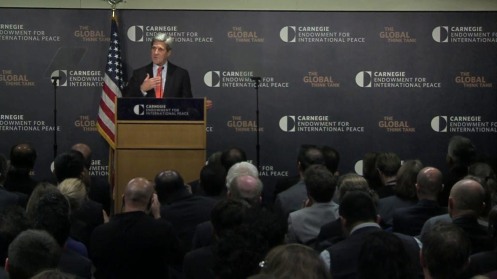
Kerry speaking at Carnegie Endowment, the oldest think tank in US.
Funding of think tanks
Corporations and philanthropic foundations are the main sources of revenue for most of the big think tanks. Think tanks can although have other sources of funding that includes governments, wealthy individuals, endowments, also they derive their income from sales of their books, journals and other publications.
1. Corporations
2. Foundations
(grant making organizations)
3. Governments
4. Wealthy Individuals
5. Endowment Income
6. Sale of their publications like books and magazines
7. Other sources like contract income etc
Example- Breaking down the revenue sources of Center for Strategic and International Studies (CSIS) – For Fiscal Year 2013, CSIS had an operating revenue of US $32.3 million. The sources were: 32% corporate, 29% foundation, 19% government, 9% individuals, 5% endowment, 6% other. (source- wiki)
Funding of the big think tanks.
If you will check out the annual reports and donor list that is issued by the big think tanks, you will always find the name of big corporations and foundations. Below are just some of them, also apart from noticing fortune 500 Corporations as donors, also notice the names of the elite foundations such as Carnegie Corporation of New York (Carnegie Foundation), Ford Foundation, Rockefeller Brothers Fund, Rockefeller Foundation, Open Society Foundations, Bill & Melinda Gates Foundation etc.
CFR- (donor list 2016)
Brookings Institution- (Annual Report 2016)
Urban Institute- (Annual Report 2015)
RAND- (Annual Report 2015)
CSIS- (donors 2016)
PIIE- (Donors from 2013-15)
Hudson Institute- (Annual Report 2015)
Think tank Personnel
Board of Directors and members of think tanks include people from many different professions.
High level government officials- Leading politicians, diplomats, bureaucrats are members such as Brzezinski, Kissinger, Madeleine Albright etc have been board of directors and members of a number of think tanks. Presidents from Nixon to Obama have hired individuals from think tanks to fill positions in their administrations. This is another role of the big think tanks, to provide officials for the new government in Washington.
Corporate Executives- People from fortune 500 corporations are right there.
Academics- Professors and Scholars, especially from Ivy League Universities.
Journalists- All the renowned journalists are CFR members.
Officials from International Organizations- High ranking officials from United Nations, World Bank, IMF etc
Members may even include corporations and other institutions- CFR and Atlantic Council have corporate members.
Many of the elitists are head of these think tanks and they and their associates also serve as board of directors. David Rockefeller has been the head and board of director of CFR, PIIE, Trilateral Commission. His aides and associates such as Zbigniew Brzezinski and Peter George Peterson have headed and have been members of many think tanks (like PIIE, Trilateral Commision, CSIS, RAND, CFR, ICG).
The bigger think tanks have on board very Influential people from various fields.
Executives of corporations, diplomats, journalists, academics etc. Even senior government officials are members and in this way these think tanks are directly linked to policy makers.
Take for example the board of directors of Peterson Institute for International Economics (PIIE).
MEMBERS OF THE BOARD
Peter G. Peterson * (Chairman of the Board)
Founder and Chairman, Peter G. Peterson Foundation; former Senior Chairman, The Blackstone Group; former Secretary of Commerce and Assistant to the President for International Economic Policy
James W. Owens * (Chairman of the Executive Committee)
Chairman and CEO Emeritus of Caterpillar
Caroline Atkinson
Head of Global Policy, Google, Inc.
Ajay Banga
President and Chief Executive Officer, MasterCard
C. Fred Bergsten *
Senior Fellow and Director Emeritus, Peterson Institute for International Economics; former Assistant Secretary of the Treasury for International Affairs
Mark T. Bertolini
Chairman, Chief Executive Officer and President, Aetna
Ben van Beurden
CEO, Royal Dutch Shell
Nancy Birdsall
President, Center for Global Development; former Executive Vice-President of the Inter-American Development Bank
Frank Brosens
Principal, Cofounder, Taconic Capital Advisors L.P.
Ronnie C. Chan
Chairman, Hang Lung Properties Limited
Susan M. Collins
Joan and Sanford Weill Dean of Public Policy, Professor of Public Policy, and Professor of Economics, Gerald R. Ford School of Public Policy, University of Michigan
Richard N. Cooper
Maurits C. Boas Professor of International Economics, Harvard University
Andreas C. Dracopoulos *
Director and co-President, Stavros Niarchos Foundation
Barry Eichengreen
Professor, Department of Economics, University of California, Berkeley
Jessica Einhorn *
Former Dean, SAIS, Johns Hopkins University; former Managing Director for Finance and Resource Mobilization, World Bank
Peter Fisher
Senior Director, BlackRock Investment Institute; former Under Secretary of the Treasury for Domestic Finance
Douglas Flint
Group Chairman, HSBC Holdings plc.
Stephen Freidheim *
CIO, Founder and Managing Partner, Cyrus Capital Partners, LLC.
Jacob A. Frenkel
Chairman of JPMorgan Chase International, former Governor of the Bank of Israel; former IMF Economic Counselor and Director of Research.
Maurice R. Greenberg
Chairman and CEO, C.V. Starr and Co., Inc.; former Chairman, American International Group.
Herbjorn Hansson
Chairman and CEO, Nordic American Tankers Limited.
Stephen Howe, Jr.
US Chairman and Americas Managing Partner, Ernst & Young LLP
Hugh F. Johnston
Chief Financial Officer, PepsiCo, Inc.
Michael Klein
Managing Partner of M. Klein and Company, LLC; former Vice Chairman, Citigroup.
Nobuyori Kodaira
Member of the Board of Directors, Toyota Motor Corporation and Chairman, The Toyota Foundation.
Charles D. Lake II
President, Aflac International Incorporated, and Chairman, Aflac Japan.
Andrew N. Liveris
Chairman, President, and Chief Executive Officer, Dow Chemical Company.
Sergio Marchionne
Chairman and Chief Executive Officer, Chrysler Group LLC; Chief Executive Officer, Fiat S.p.A., and Chairman, Fiat Industrial S.p.A. and CNH Global N.V.
Pip McCrostie
Former Global Vice Chair – Transaction Advisory Services, EY.
Hutham S. Olayan *
President and CEO, Olayan America.
Peter R. Orszag
Vice Chairman of Investment Banking and Managing Director, Lazard Freres & Co.
Michael A. Peterson *
President and Chief Executive Officer, Peter G. Peterson Foundation.
Jonathan Pruzan
Chief Financial Officer, Morgan Stanley
Ginni M. Rometty
Chairman, President and Chief Executive Officer, International Business Machines Corporation.
Lynn Forester de Rothschild *
CEO and President, E.L. Rothschild Limited.
Richard E. Salomon *
Managing Partner, East End Advisors, LLC.
Sheikh Hamad Saud Al-Sayari
Former Governor, Saudi Arabian Monetary Agency.
Lawrence H. Summers *
Charles W. Eliot University Professor, Harvard University; former Secretary of the Treasury; former Chair of the National Economic Council.
Mostafa Terrab
Chairman, Chief Executive Officer, President, OCP S.A.
Ronald A. Williams
Retired Chairman and CEO, Aetna Inc.
Min Zhu
Deputy Managing Director, International Monetary Fund
Robert B. Zoellick *
Chairman of the Board of Directors, AllianceBernstein; former President, World Bank Group; former US Trade Representative.
(source- https://piie.com/about/board-directors)
This is clearly a highly influential network of people. PIIE is just one example, all big think tanks have this type of board of directors.
Think tanks market their Ideas
Think tanks not only develop ideas but also disseminates them. They intend to influence both the government policy makers and the the general public. For think tanks advocacy is as important as research. Think tanks are at the forefront in the battle of ideas. What they research is not kept in complete secrecy and they do publish their research findings and policy recommendations. Ideas are marketed through their publications and digital content. They have their own journals, magazines, they publish monographs, memorandums, books, policy papers, reports, write articles on their website, they make audio and video content, they organize conferences, seminars, panel discussion, workshops etc. The big thanks like CFR also invite world leaders to speak at their institution. Policy makers are their prime target. They seek to provide advice directly to officials in government departments and agencies and through congressional hearings and testimonies.
![Page1 [www.imagesplitter.net]](https://endalltyranny.files.wordpress.com/2017/06/page1-www-imagesplitter-net.jpeg?w=700)
Scholars from Hudson Institute on various TV channels (Hudson Report 2015)
Another way think tanks tend to influence the public is by their media presence. The scholars from think tanks write articles in renowned newspapers and are also regularly invited by mainstream media for their expert opinion, analysis & commentary. You will notice people from these big think tanks on news channels very often. This is how they influence both policy makers and the public. They compete with others not only in the policy making arena but also in the realm of public opinion.
Some of the key think tanks-
Council on Foreign Relations (CFR)

Founded: 1921
Location: New York City, New York, U.S.
Political Orientation: Independent
Revenue: $ 77 Million (2015)
Journal: Foreign Affairs
Website: https://www.cfr.org/
Brookings Institution

Founded: 1916
Location: Washington, DC, U.S
Political Orientation: Independent
Revenue: $ 108 Million (2016)
Journals: Brookings Papers on Economic Activity, Economia, and Behavioral Science & Policy.
Website: https://www.brookings.edu/
Chatham House (Royal Institute of International Affairs)

Founded: 1920
Location: London, England
Political Orientation: Independent
Revenue: £ 15 Million (2016)
Journal/Magazines: International Affairs and The World Today.
Website: https://www.chathamhouse.org
The Club of Rome

Founded: 1968
Location: Zurich, Switzerland
Political Orientation: Independent
Website: https://www.clubofrome.org/
RAND Corporation

Founded: 1948
Location: Santa Monica, California, U.S.
Political Orientation: Independent
Revenue: $ 351 Million (2014)
Journal/Magazines: RAND Journal of Economics, RAND Review
Website: http://www.rand.org/
Carnegie Endowment for International Peace
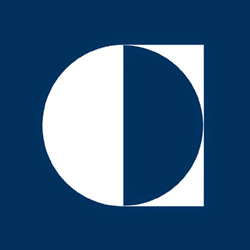
Founded: 1910
Location: Washington, D.C., U.S.
Political Orientation: Independent
Revenue: $ 34 Million (2015)
Website: http://carnegieendowment.org/
Atlantic Council

Founded: 1961
Location: Washington, D.C., U.S.
Political Orientation: Conservative
Affiliation: Atlantic Treaty Association.
Revenue: $ 21 Million (2016)
Website: http://www.atlanticcouncil.org/
Center for Strategic and International Studies (CSIS)

Founded: 1962
Location: Washington, D.C, United States
Political Orientation: Independent
Revenue: $ 43 Million (2014)
Journals: The Washington Quarterly, New Perspectives in Foreign Policy
Website: https://www.csis.org/
Hudson Institute

Founded: 1961
Location: Washington, D.C., United States
Political Orientation: Conservative
Revenue: $ 13 Million (2016)
Website: https://www.hudson.org/
International Crisis Group

Founded: 1995
Location: Brussels, Belgium
Political Orientation: Independent
Website: https://www.crisisgroup.org
Aspen Institute

Founded: 1950
Location: Washington, D.C., United States
Political Orientation: Independent
Revenue: $ 101 Million (2014)
Magazine: IDEAS
Website: https://www.aspeninstitute.org/
American Enterprise Institute

Founded: 1938
Location: Washington, D.C., U.S.
Political Orientation: Conservative
Revenue: $ 84 Million (2015)
Magazine: The American
Website: http://aei.org/
Urban Institute

Founded: 1968
Location: Washington, D.C., U.S.
Political Orientation: Liberal
Revenue: $ 95.3 Million (2015)
Website: http://www.urban.org/
National Bureau of Economic Research

Founded: 1920
Location: Washington, D.C., U.S.
Political Orientation: Independent
Revenue: $ 35 Million (2014)
Website: https://nber.org/
Peterson Institute for International Economics

Founded: 1981
Location: Washington, D.C., U.S.
Political Orientation: Independent
Revenue: $ 11 Million (2014)
Website: https://piie.com/
The Heritage Foundation

Founded: 1973
Location: Washington, D.C., U.S.
Political Orientation: Conservative
Revenue: $ 96 Million (2014)
Journal: Policy Review (1977-2013)
Website: http://www.heritage.org/
Center for American Progress

Founded: 2003
Location: Washington, D.C., U.S.
Political Orientation: Liberal
Revenue: $ 45 Million (2014)
Website: https://www.americanprogress.org/
Cato Institute
Source Article from http://feedproxy.google.com/~r/blacklistednews/hKxa/~3/_BnPHO8tXVQ/M.html
 RSS Feed
RSS Feed















 June 19th, 2017
June 19th, 2017  Awake Goy
Awake Goy 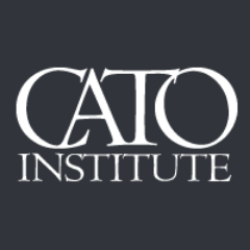
 Posted in
Posted in  Tags:
Tags: 













